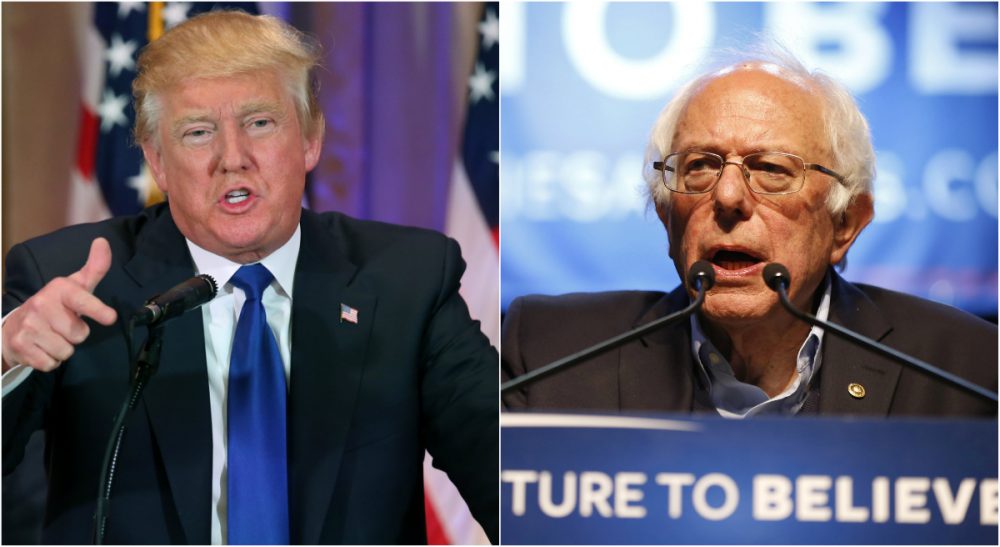Advertisement
The Year Of The Political Outsider

“When Harry Met Sally” was a love story. “When Hillary Meets Donald,” expected to be opening this summer at a precinct near you, will be anything but. Democrats think they know the denouement — Hillary bests Donald — but they may well be wrong. As hated and polarizing as Trump is, and as much as it appears vast numbers of Republicans will turn away from him altogether, he nonetheless has a strong chance of being the survivor of this spectacle as the November closing credits roll. The reason? As with all stories, it’s all about the narrative.
One narrative is the rationalist’s approach: On almost every measure of political viability and competence, Clinton looks better than Trump. Experience and expertise, runs the thinking, beat brashness and rashness.
[Sanders] and Trump both argue that real change can’t come from an old guard funded by big money and big banks. ... Against this story of 'real change,' Clinton makes the perfect foil.
Trump has managed to offend most every key constituency out there, including women, Hispanics, immigrants and even the pope. His personal disposition comes across as nasty and mean-spirited. “You can’t insult your way to the presidency,” Jeb Bush told his rival. Maybe not — but the nomination, apparently, yes. (Although one has to think that Marco Rubio has now one-upped Trump. At a campaign stop, Rubio mocked the size of Trump’s hands. “And you know what they say about men with small hands,” he went on. That seemed a new low in presidential politics — asking voters to make a decision based on the size of a candidate’s genitals.)
Meanwhile, decades in the public eye, Clinton has seen and heard it all. Not only can she roll with the punches, but she excels in rough-and-tumble debates — as Bernie Sanders learned to his chagrin. She is also a master of policy, an area in which Trump is notably unschooled. It is hard to imagine any thoughtful voter seeing Trump as better prepared than her for the office or comfortable with the notion of the temperamental businessman holding the reins — and the nuclear launch codes — of the most powerful nation on earth.
To top it off, even the GOP seems ready to defect from its nominee. Already, some prominent members of the party — including Sen. Ben Sasse of Nebraska, strategist Kevin Madden, former RNC chair Mel Martinez and Massachusetts Gov. Charlie Baker — have said they won’t support Trump as their nominee. Many others have laid down broad hints they’ll follow suit. “Republicans for Hillary” clubs are hardly far-fetched.
For all of these reasons then, Trump is toast.
And yet, haven’t we heard this all before — indeed, ever since Trump entered the race? The other candidates, the Republican establishment and most of the media have predicted with utter certainty that Trump would never catch on, that when he caught on, he would collapse, and that when he collapsed he could never be nominated. All of the reasons given — his insults, his demeanor, his policy vagueness and so on — have mattered not a whit.
That’s because there’s a different narrative at play, one at which Trump excels: the outsider versus the insider. And if Trump can make this the narrative of the general election, he’ll be taking the oath of office on Jan. 20, 2017.
For both parties, the story of this election so far has been a story of voter anger and distrust — a potent and growing phenomenon. Trump has tapped into it perfectly. But so too, on the left, has Sanders. In fact, both men are much more alike than either would care to admit. Sanders rise wasn’t brought about because millions of Americans suddenly decided they prefer socialism; most of them, I daresay, have no idea what it is. Rather, Sanders represented a break with and rejection of the political elite. He and Trump both argue that real change can’t come from an old guard funded by big money and big banks. (One of Sanders’s most widely played commercials — “People are sick and tired of establishment politics and they want real change” — could just as easily have been used to promote Trump.)
The year 2016 has the potential to be a sweeping, almost revolutionary election. In such an election, policy matters far less than attitude.
Against this story of “real change,” Clinton makes the perfect foil. There is no one more part of the establishment than her. Her husband was elected president fully a generation ago — 25 years -- and the Clintons have dominated national politics since. Even with her loss to Obama, Clinton continued undeterred, building up her resume even further as secretary of state. Clinton’s high negatives, her contributions from Wall Street and her many alleged ethical lapses (such as the email scandal that still dogs her) make her an enormously easy target.
The year 2016 has the potential to be a sweeping, almost revolutionary election. In such an election, policy matters far less than attitude. Trump and Sanders both understand the depth of voter anger, the sense many have that some are favored while the rest are left hanging. The people, one might say, “are mad as hell and (they’re) not going to take this anymore.” That line, from the 1976 movie “Network,” just might be the winning script for this year’s show as well.
